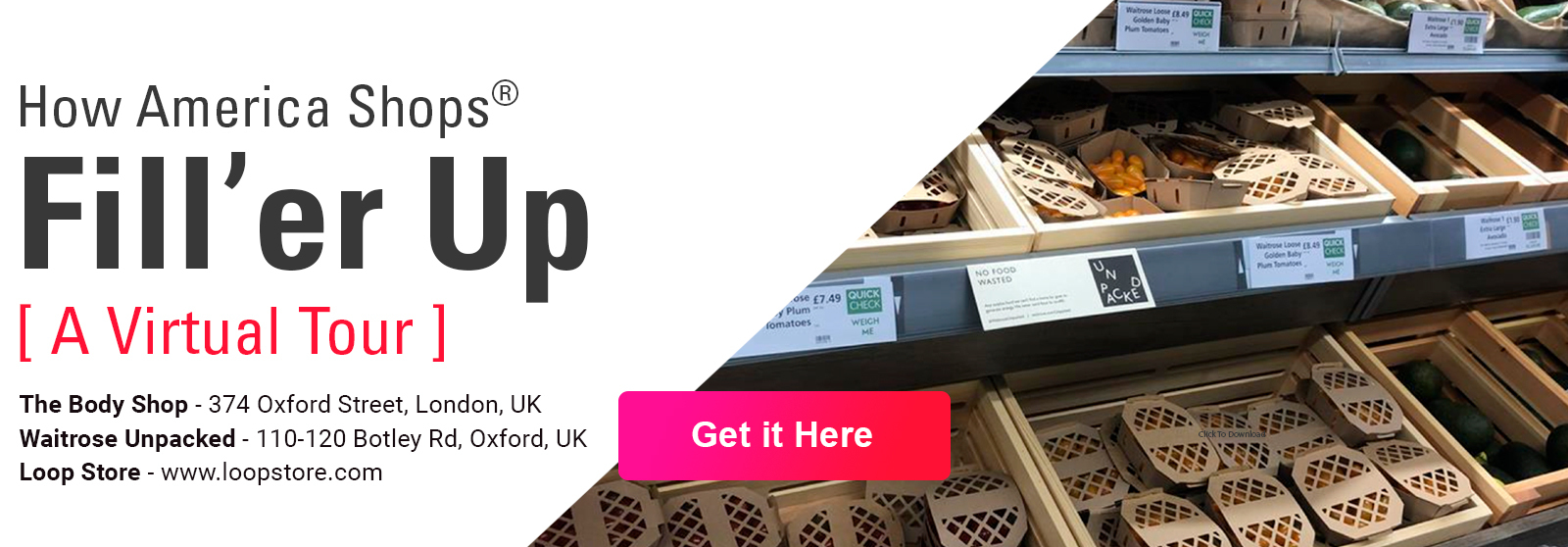The fringe movement of sustainability is moving into the mainstream, fast. Nearly 90% of your shoppers are reusing the bottles and bags their products come in, and we predict they will focus on “first-use” packaging next. The WSL “Fill’er Up” report shows how three merchants are eliminating waste and discovered the movement is well beyond the fringe.
Bottles and boxes, mostly in plastic, are the poster boys of pollution, but in the aisles of stores, packaging waste is still stacked as high as the customer’s head. Now shoppers in some markets are getting ahead of the waste by packing their own goods – voluntarily.
Based on our How America Shops® research, we see shoppers are spending in ways that show their concern for the environment.
- Most shoppers are reusing their plastic bottles and bags and buying preowned products. And they are doing it with momentum – many more so now than two years ago.
- More than half of shoppers today are noticing and choosing brands and retailers that highlight how they support sustainability. (The percentages skew much higher among younger shoppers.)
Waste is Everywhere. So Let’s Start with the Package
Our report “Fill’er Up” shows how three retailers are making the idea of no packaging work, and the expansion of their test stores means shoppers are signing on. For these shoppers, the act of supporting sustainable values through what they buy is morphing from a “nice to do” to a “must do.”
WSL took an investigative tour of three merchants that are involving their customers by replacing brand packages with refillable and recyclable containers and creating the baseline of a new retail “normal.”
Retailers are Proving Packaging Can Be Optional
- The Body Shop: This chain, founded on environmentally focused beauty products, has now opened the next generation of sustainable retail in London. There are stations for product refills and package recycling as well as shelving and fixtures made with reclaimed materials. One-use products, such as facial wipes, have been replaced with reusable alternatives. Sales assistants help shoppers navigate this new package-less process, and The Body Shop prominently features charitable donations its shopper’s support.
- Waitrose: This British supermarket chain is expanding a test store concept that has less packaging waste. Plastic has been eliminated in produce, and some frozen foods are unpacked so shoppers can place them into reusable containers. Refill stations are used for groceries, from pasta to detergent. Waitrose makes a point of including the shopper on its mission, with language that heralds the power of collaboration to create a better environment.
- Loop: An online-only concept dedicated to abolishing waste, Loop partners with national retailers to ship goods in recycled and reusable stainless steel containers. Customers return the empties via mail, for free, in a reusable Loop tote. Loop then cleans the containers and delivers fresh product in them. The brand also is partnering with several major CPG companies, including Procter & Gamble and Unilever. One could argue that the carbon footprint of shipping packages offsets the packaging waste – but it’s an ambitious start.
See More in the “Fill’er Up” Report
We’ve given you just the high-level descriptions. The breadth of these strategies involve every touchpoint of the shopping trip, especially when it comes to how these concepts involve and support their customers.
And with nearly 90% of customers volunteering to cut their own packaging waste, the moments are numbered before they flat-out refuse retailers and brands that are not on board with them.
Don’t waste this opportunity. If you want to see what else these companies are doing, as well as what appears to be working, you can purchase our How America Shops®, “Fill’er Up” virtual tour here.


